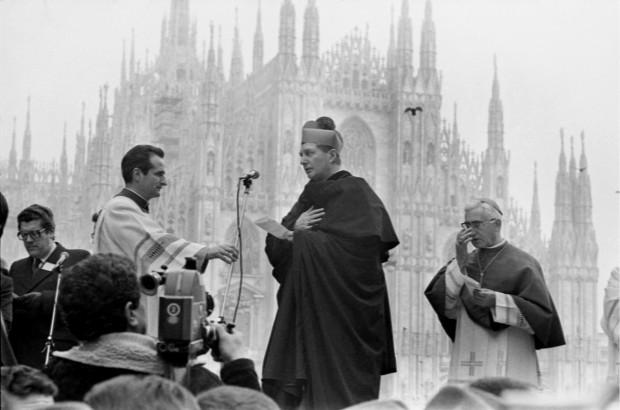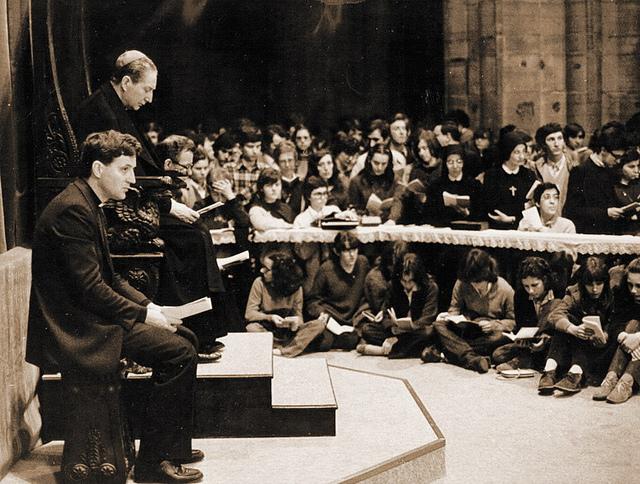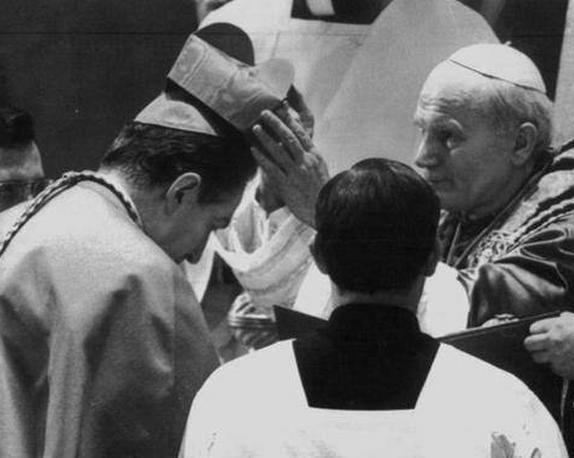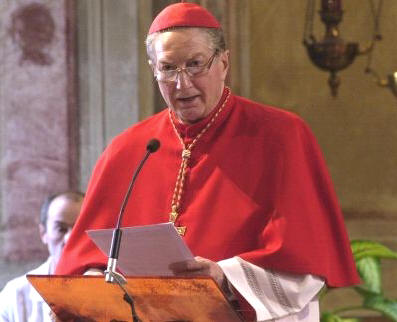Carlo Maria Martini was born on 15th February 1927 and joined the Society of Jesus on 25th September 1944 when he was seventeen years of age. After his novitiate at Cuneo, he studied philosophy at Galarate and Theology at the Theological faculty of Chieri, where he was ordained priest on 13th July 1952 by the Archbishop of Turin Cardinal Maurilio Fossati.
 In 1958 he graduated in Theology from the Pontifical Gregorian University with a thesis on the historical problem of the Resurresction. After having taught at the faculty of Chieri, he returned to Rome in 1966 and graduated in Sacred Scripture with a summa cum laude at the Pontifical Biblical Institute, where he was first appointed dean of the Faculty of Sacred Scripture and then Rector from 1969 to 1978. During that same year he was appointed Rector of the Pontifical Gregorian University.
In 1958 he graduated in Theology from the Pontifical Gregorian University with a thesis on the historical problem of the Resurresction. After having taught at the faculty of Chieri, he returned to Rome in 1966 and graduated in Sacred Scripture with a summa cum laude at the Pontifical Biblical Institute, where he was first appointed dean of the Faculty of Sacred Scripture and then Rector from 1969 to 1978. During that same year he was appointed Rector of the Pontifical Gregorian University.
He published several scientific publications, among which was a translation of the Acts of the Apostles (1970). He also contributed to the collection La parola di Dio alle origini della Chiesa (1980), and together with several other specialists of different religious confessions published the highly critical edition of the Greek New Testament (fourth edition and revised in 1993). A preacher of the Spiritual Exercises and active in the Ecumenical dialogue with the Jewish faith, he was in the Lenten season of 1978 invited to preach the Spiritaul Exercises to Pope Paul VI at the Vatican.

On 29th December 1979 John Paul II named him Archbishop of Milan and consecrated him himself on the solemn feast of the Epiphany in 1980. His official entrance in Milan as successor to Cardinal Colombo took place on 10th February of that same year.
His first pastoral letter was dedicated to the contemplative dimension of life (La dimensione contemplativa della vita). La Scuola della Parola (The School of the Word) was the first initiative which he started in November of 1980. This was to help the faithful approach Scripture using the method of the lectio divina.
During the Consistory of 2nd February 1983 he was made Cardinal by John Paul ll.
 In November 1986 during the diocesan convention held at Assago with the title Farsi Prossimo (Becoming a neighbour), he launched the initiative of the School of formation for social and political commitment. In October of the following year he started a series of round table meetings with two different points of view on the questions of faith, which he called the Cattedra dei non credenti. (The Chair of non-Believers) which had echoes even outside the circles of the Church.
In November 1986 during the diocesan convention held at Assago with the title Farsi Prossimo (Becoming a neighbour), he launched the initiative of the School of formation for social and political commitment. In October of the following year he started a series of round table meetings with two different points of view on the questions of faith, which he called the Cattedra dei non credenti. (The Chair of non-Believers) which had echoes even outside the circles of the Church.
On 4th November 1993 he convened the 47th Diocesan Synod of Milan, which was concluded on 1st February 1995, while in 1997 he presided over the celebration of the XVI centenary of the death of St. Ambrose the patron of the Diocese.
He remained the pastoral leader of the diocese till the end of 2002. For over twenty years during which, among other things, the city lived through the years known as gli anni di piombo (the years of lead) meaning the years of terrorism and upheavals of the Mani Pulite (the Clean Hands) referring to many scandals of financial corruption, when Martini became the point of reference for moral values. All the city believers as well as non-believers held him in very high regard, as was confirmed when a group of the Red Brigades gave up their weapons and consigned them to the archbishop’s  curia.
curia.
The commitment of Cardinal Martini during his twenty-three years of his Episcopate made him become one of the most well known and respected persons within the Catholic Church and soon well beyond the diocesan and the national borders. He participated in numerous assemblies of the Synods of Bishops; he was rapporteur at the VIth General Assembly; and in 1983 with the theme of Reconciliation and Penance in the mission of the Church. He was a member of the Council of the Secretariate of the Synods of Bishops between 1980 to 1990 as well as between 1994 and 2001; and President of the European Council of Bishops between 1986 and 1993.
He was awarded several academic awards, and in the year 2000 he became an honorary member of the Pontifical Academy of Sciences.
Both his pastoral letters as well as his talks addressed to the city had vast echoes well beyond the boundaries of his diocese. They were collected in fifteen volumes (1981 -1994), while a large selection of texts was published in 2011 under the title Le ragioni del credere (The reasons for belief). Many of his writings have been translated into various languages and have been read all over the five continents by believers and by non-believers alike.
On 11th July 2002 when he resigned from the pastoral leadership of the diocese of Milan, he went back to his biblical scholarship and chose to live most of his time in Jerusalem.
In 2008, owing to his declining health caused by Parkinson’s disease, he came back to Italy there to stay on a permanent basis. He resided at the Jesuit house in Gallarate (VA) where he passed away on 31st August 2012.